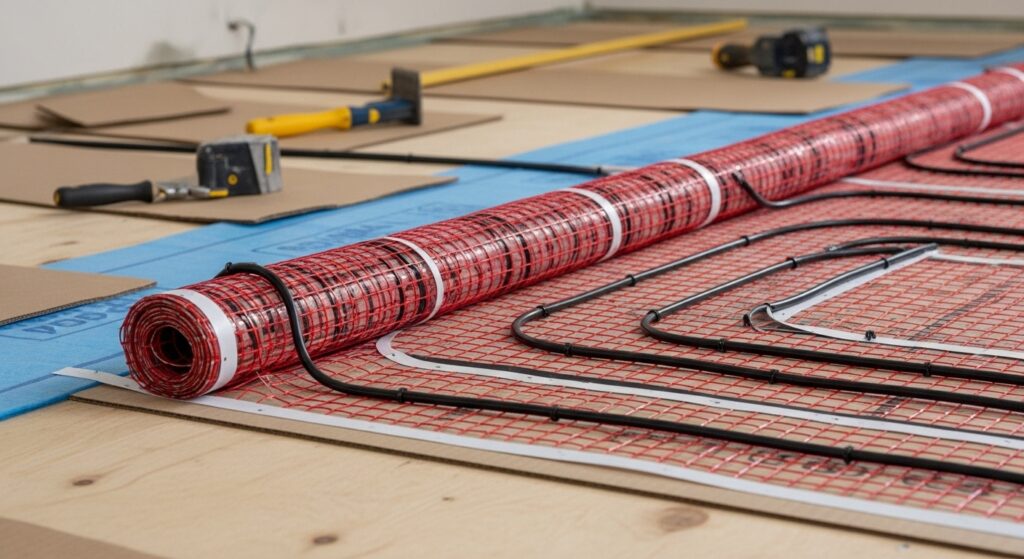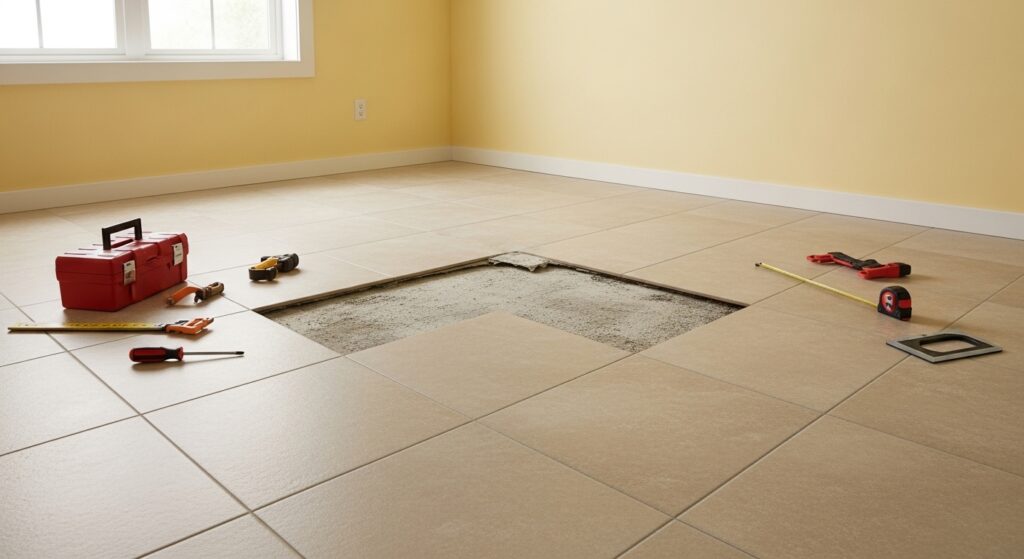Underfloor heating has become a popular choice for homeowners across the UK who are looking for a more comfortable and efficient way of heating their homes. Whether it’s electric (dry) systems or water-based (wet) systems, underfloor heating provides a gentle, even warmth that radiators simply can’t match.
But what happens when your system develops a fault? A patch of floor remains cold, the thermostat doesn’t respond, or you notice higher energy bills. At first glance, it may be tempting to roll up your sleeves and try to tackle the problem yourself. After all, many of us like to think we can handle DIY projects.
However, underfloor heating repair is one area where DIY really isn’t recommended. From safety concerns to hidden complexities, attempting to repair the system yourself can lead to bigger problems, higher costs, and even serious risks.
In this article, we’ll explain exactly why underfloor heating repair is not a DIY job and why calling in a qualified professional is always the smarter choice.

1. The Complexity of Underfloor Heating Systems
Unlike a leaky tap or a broken shelf, underfloor heating is a highly complex system. Both electric and water-based systems involve multiple layers of installation:
- Electric systems include heating cables or mats, insulation boards, thermostats, and wiring connections.
- Water systems (hydronic systems) require pipework, pumps, a manifold, valves, and a boiler connection.
All of this sits beneath your flooring – often beneath tiles, stone, wood, or carpet – which makes access extremely difficult.
When something goes wrong, the problem could be caused by any number of factors: damaged heating elements, faulty sensors, wiring issues, airlocks in pipes, or problems with the manifold. Pinpointing the issue requires both specialist tools and detailed knowledge of how the system works.
Without proper training, most homeowners will not know where to start – and poking around blindly often makes the situation worse.
2. Safety Risks of DIY Repairs
One of the most pressing reasons to avoid DIY underfloor heating repairs is safety.
Electrical Hazards
With electric systems, you are dealing with high-voltage wiring hidden beneath your floor. Attempting to repair or replace cables without the right knowledge can result in electrocution, fire hazards, or damage to your property’s electrical system. UK law requires that electrical work in homes be carried out by someone who is Part P certified – meaning they are authorised to work safely and legally with household electrics.
Water Damage
For hydronic systems, incorrect handling can lead to leaks, water damage, and even structural issues. A small puncture in the pipework can release large amounts of water under your flooring, leading to rot, mould, and costly repairs.
Flooring Damage
Trying to access the heating system without professional tools can also ruin your flooring. Tiles may crack, wood may splinter, and carpets may be permanently damaged – leaving you not only with a broken heating system but also with the added expense of replacing flooring.
3. Specialist Tools Are Essential
Professional heating engineers use advanced diagnostic tools to identify faults quickly and accurately. For example:
- Thermal imaging cameras show cold patches on the floor, helping engineers locate the exact area of the fault.
- Cable testers and multimeters allow them to test continuity and resistance in electric systems.
- Pressure testing equipment is used on water-based systems to detect leaks.
These tools are not typically available in a homeowner’s toolbox and can cost hundreds or even thousands of pounds to purchase. More importantly, professionals know how to interpret the results correctly.
Without these tools, a DIY approach often involves guesswork – which usually means unnecessary floor damage, wasted time, and higher repair bills in the end.
4. DIY Fixes Often Cause Bigger Problems
Many homeowners believe they are saving money by attempting their own repairs, but the reality is often the opposite. Common mistakes include:
- Incorrectly splicing electric heating cables – which can create fire hazards or result in the system failing altogether.
- Using the wrong adhesives or sealants – leading to overheating or permanent damage.
- Failing to properly re-pressurise water systems – which can leave you with cold spots or complete system failure.
- Damaging sensors or thermostats during floor removal – adding more repair costs.
A small fault that could have been repaired easily by a professional often snowballs into a much larger (and more expensive) issue when tackled incorrectly by DIY methods.
5. Legal and Warranty Issues
Another important factor is compliance with building regulations and warranty protection.
- Warranty Voidance: Many underfloor heating systems come with manufacturer warranties that are only valid if repairs are carried out by certified professionals. Attempting DIY repairs will likely void this protection, leaving you with no cover for future issues.
- Building Regulations: In the UK, electrical work must comply with Part P of the Building Regulations. If you carry out unauthorised work and later sell your home, you may run into problems when the buyer requests compliance certificates.
Essentially, DIY repairs may save you a call-out fee in the short term but could cost you far more when it comes to resale value or warranty claims.
6. Hidden Costs of DIY Repairs
At first glance, it might seem that DIY repairs will save you money. But let’s break down the hidden costs:
- Buying specialist tools (thermal imaging, multimeters, pipe testers).
- Purchasing replacement parts (and potentially the wrong ones).
- Replacing damaged flooring from poor access attempts.
- Paying for professional repairs to fix the original problem plus the new issues caused.
When you add it all up, the cost of DIY repairs often exceeds the cost of simply calling in a professional from the start.
7. The Benefits of Hiring a Professional
When you hire a qualified underfloor heating engineer, you’re paying not just for their time but for their expertise, equipment, and peace of mind.

Accurate Diagnosis
A professional can identify the root cause of the fault quickly, often within an hour, saving you time and stress.
Safe Repairs
You can be confident that all work is carried out in compliance with safety standards and building regulations.
Long-Term Reliability
Proper repairs ensure that your heating system will continue working efficiently for years, avoiding repeat call-outs.
Warranty Protection
Most professionals provide a guarantee on their work, giving you extra assurance.
8. Real-Life Example: The Cost of DIY vs Professional Repair
Consider this scenario: a homeowner in London noticed a cold patch in their tiled kitchen floor. Assuming it was a minor issue, they lifted several tiles and attempted to locate the break in the heating cable themselves.
Unfortunately, they cut into the wrong section of the cable, causing more damage. They also cracked several tiles in the process. By the time they called in a professional, they needed not only a cable repair but also replacement tiles, new adhesive, and additional labour time.
The final bill came to nearly £1,200 – around four times the cost of what the original fault would have been if a professional had been called in right away.
9. Peace of Mind is Priceless
At the end of the day, underfloor heating is an investment in comfort and energy efficiency. Protecting that investment by ensuring it is properly maintained and repaired is essential.
Attempting DIY repairs may seem tempting, but the risks – to your safety, your flooring, and your bank balance – far outweigh the potential savings. By hiring a qualified professional, you gain peace of mind knowing that the job will be done right, safely, and efficiently.
Conclusion
Underfloor heating repair is not a DIY job for good reason. The complexity of the systems, the specialist tools required, the risks to safety, and the potential for long-term damage all make professional expertise essential.
While DIY projects can be fun and cost-effective in many areas of home improvement, underfloor heating repair is not one of them. Instead, calling a certified underfloor heating engineer will save you money, time, and stress – and ensure your home remains warm and comfortable throughout the year.
So, the next time your underfloor heating develops a fault, resist the urge to grab the toolbox. Pick up the phone and call a professional instead. Your future self (and your heating system) will thank you.
